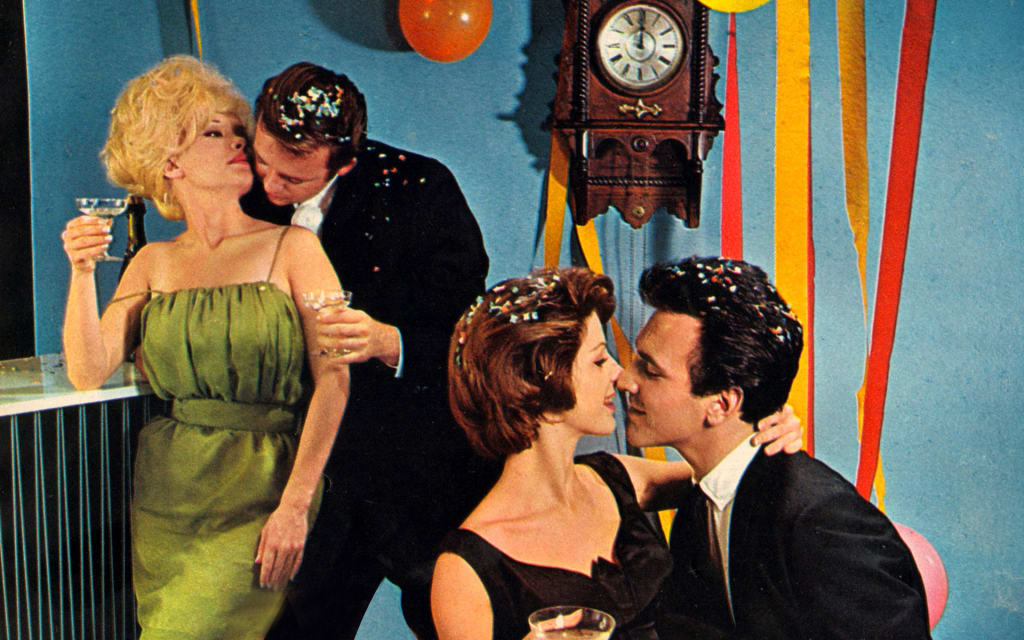Swinger Sex Advice
An in depth look at swinging culture offers sex advice and reveals the many perks of swinger sex.

It was her first orgy. "There were six couples not counting Shawn and me. When we got there they were just getting acquainted, the same way people would at a straight party. Asking all the ordinary party questions: What do you do? How many children (or dogs) do you have? Did you see Clockwork Orange? Only they also asked: How long have you been swinging? Did you ever swing with so-and-so? I knew that in an hour or so, the men would start putting their hands on the thighs of other men's wives and soon everyone would go off and ball someone else's spouse. Maybe there would be more exotic things too—threesomes, foursomes, daisy chains. I was nervous. I just wished I knew exactly how it would start to happen, how you were supposed to behave. I was afraid I'd do something, well, embarrassing. I went over to Karin, the wife half of the couple who had invited us to the party. Karin, whispered, 'What do you do in between?"."
Leah laughs when she remembers that first orgy now. She is 27, Shawn is 30. They have no children, two dogs, Mitch and Charlie. Shawn is general manager of a car company. Leah is a freelance writer. They've been married nearly four years.
"After seven or eight years of marriage you have orgasms and everything," Leah told me, "but it's not as exciting as it was in the beginning. So to get ahead of that curve, we are spicing things up a little bit. I don't even think a person can excite you mentally when you know him that well with a new person maybe you'll do something they've never felt, they'll react in a way you never expected . . .
"About two years ago my husband proposed, sort of abstractly, that we try things with another couple. I was shocked. But the idea stayed with me. I didn't want to have an affair. I've had opportunities—every girl has-but something prevents me and I know if I reached that point I’d want a divorce. I don't think he's cheated on me either. Then we started hearing of places out in California. There was a Time magazine article about them. It mentioned a place in New York, a club that now meets at the 500 restaurant. It meant there was a place to go to meet people..."

via Elle
Baiting the Bourgeoisie
Leah and Shawn went, met a couple who invited them to the party, and became swingers. In the past, aristocrats, jet-setters, and movie stars had a "wild" sex life—or people hoped they did. There were always free-thinking groups who consciously sought freedom of the self in sexual abandonment, who tried to uncover the aesthetics of sensuality and at the same time give the finger to the bourgeoisie. And ever since colonial days, America has had Utopians going off to form communes, some of which believed in group marriage or free love.
Then, starting sometime in the early 50s, nice young middle-class couples started making love to the couple next door. They saw this activity as their initiation into the sophisticated with-it life the word "swinging" implies.
Carolyn Symonds, in her master's thesis A Pilot Study of Peripheral Behavior of Sexual Mate-Swappers, divides swingers into two sorts. The "Utopian Swinger" seeks to change sexual relations as part of an attempt to change all social relations. The "Recreational Swinger," on the other hand, deviates from established social norms only in his sexual activities. Recreational Swingers swing together much the same way "straight" couples play golf or bridge together. It is these people who have recently aroused the interest of social scientists, and it is these with whom this article will be concerned.
"After seven or eight years of marriage it's not as exciting as it is in the beginning." Certainly something is missing in many marriages. In the United States 40 to 50 percent of marriages end in divorce. One or both partners in many of the marriages that do last have adulterous relationships of some sort. Some couples simply shrug their shoulders and say: "Well it's not as exciting as it used to be, but that's life." An increasing number, like Leah and Shawn, try swinging instead of shrugging.
History of Swinging
Swinging began spontaneously, but gathered pace fast after an article about it appeared in Mr Magazine in 1956. Various publications catering to swingers began to emerge shortly afterwards, though one—La Plume—had already started in 1955. The development of the pill and the intra-uterine device, ensuring women safety from pregnancy, are agreed to have been a major factor in the rise of swinging. (These are the most common forms of protection among swingers, with the condom also being included in the mix). Increased recognition of female sexuality and of women's rights also contributed by making the traditional pattern of adulterous husband and faithful wife repugnant to many couples. The climate of increased sexual permissiveness encouraged people to cherish greater sexual expectations. Finally, publicity about swingers increased their ranks for it was often the discovery that other people, other normal people, were swinging, that led a couple to try to realize their own fantasies.
How many couples are swinging now? It's impossible to be sure. Estimates vary from half a million couples to as many as eight million. "It's either a growing phenomenon, or people are talking about it more," says Dr. Wardell Pomeroy, ex-President of the American Association of Marriage 8 Family Counsellors. "It's all over the country."
During the 1970s, the largest concentration of swingers was in the San Francisco and Los Angeles area. The New York, Boston, Washington circuit, greater Miami, Chicago, and the Texas, Louisiana, Mississippi areas come next. Newsweek reporters found policemen in Detroit, small-town ministers in Georgia, and Atlanta suburbanites who swing. There are swinger's organizations in Indiana, Ohio, Maryland, Minneapolis, Philadelphia. Some of the swinger's magazines list ads by state, and all the states are represented.

via The Dreamers
Religious Swingers
Formerly, swingers were classified as middle-class with a vengeance. Gilbert Bartell, in Group Sex, his 1970s study of 280 suburban swingers in the Chicago area, found that of the men, 42 percent were salesmen of some sort and many were professionals. Of the women, 78 percent were housewives, and 83 percent had married between the ages of 17 and 21. Among the couples, 87 percent had either two or three children, and 85 percent were giving their children some kind of religious training. Inner-city swingers tended to be more varied and more tolerant, but middle-class conservatives were still predominate. The organizer of the Inner Sanctum club in New York (2400 active members, 1500 inactive, at the time) told me that his clientele was not only mostly middle-class, but had a high percentage of professionals.
How did all these home-owning, churchgoing young parents get together? Usually it is the husband who introduced the idea. Some wives were so against it initially that they become physically ill. Finally, the wife agreed to go along, afraid her husband would cheat, or just remain angry with her if she did not. But some wives never really enjoyed it. Some rarely achieve orgasm except with their spouse but enjoyed swinging anyway. Often, though, the wife began to enjoy it more than the husband. Certainly some men have trouble getting or maintaining erections, especially at large parties.
Couples in an urban area preferred to meet through bars or clubs, usually organized by other swingers. Big clubs occasionally rented hotels for swinging weekends and plan swinging vacations. A few of the national swingers magazines—of which there were about 50, from tabloids to slicks—also ran clubs. People who lived in rural areas have little choice but to meet through advertisements in these magazines. Couples who had been swinging for a while tend to meet other couples through recommendation or at parties.
Most couples liked to have a first non-swinging date in a neutral place to see if all four parties appeal to each other. Those who lived in remote areas, however, had to take their chances. Couples sometimes drove 500 miles to meet other couples, and it was accepted that, after a drive like that, they would sleep over. Couples may swing "open"—with both pairs in the same room, sometimes having group sex proper—or "closed," in separate rooms. Most seemed to prefer beginning with a closed session and then moving into the same room for a second open session. This allowed each person to get to know the new partner a bit, without the distraction or possible self-consciousness induced by the presence of others. Then, when they were more relaxed, they joined the others for an open session. When several couples got together at parties, they may have paired off privately or joined in group activities. Parties had the advantage of offering several partners so that a man and woman could make it together even though their respective husband and wife may not be attracted. In the early days, swinging parties were sometimes highly organized. Now they are more free in structure.

via The Dreamers
Swinger’s Etiquette
Swingers want to be "nice" people. One couple will never reject another outright, nor will a woman tell a man at a party she's not interested in him. One swinger will put off another with excuses or simple aloofness and swingers are always careful to pick up on such hints quickly rather than face a putdown. If a couple wants to take another to a party, they always consult the hostfirst. Moreover they are obliged to stick with that couple or take them home if necessary. Drunkenness—rare anyway because it inhibits performance and can lead to fights—is frowned upon. Drugs may be common among younger swingers in urban areas but they are not used if they would offend anyone in a group. Jealousy and public fighting are condemned.
The golden rule among all swingers is that they believe in marriage and regard their marriage as the primary relationship in their life. They do not regard swinging as cheating because it is done with the partner's knowledge and consent, "in the open." Swingers say they are not jealous of one another because they know "It's only physical, really, with the others." Since everybody has a marriage or relationship to keep safe, there is in fact little risk of entangling affairs. Swinging singles are tolerated in some circles and single women sometimes participate, but single males usually have to be approved members of the club they are attending. After the lovemaking, partners will tell each other "That was wonderful" or "You're great" but never "I love you" or any other phrase that implies emotional involvement.
Swinging is a social activity, as well as a sexual one. In a paper presented to the Society for the Scientific Study of Sex, Duane Denfec and Michael Gorden call it "an institutionalized form for extramarital sex." As with any institution, swinging is governed by rules. The main one is discretion. Swingers often don't give out their last names and are careful to keep all knowledge of their activities from their straight friends. Club literature reads like that of any straight social club. A swinger never gives out another's number without checking with him first.

Fewer Divorces?
There are couples who try swinging a couple of times and drop out. Others are active swingers for as long as 20 years. Most, however, go through four phases, noted by anthropologists George and Nena O'Neill:
- An initial period of great excitement and frequent participation
- A reaction after bad experiences, disillusionment, or boredom leading to a substantial drop in the level of activity
- A plateau and levelling-off
- A total dropping-out or a take-it-or-leave-it attitude resulting in intermittent participation.
Active swingers are inclined to proselytize. The couple that swings together stays together is a swinger motto, and divorce rates among swingers are, in fact, significantly lower than for the population at large. Sociologists and anthropologists tend to confirm the positive effects of swinging on marriage. It improves the couple's sexual relations. It allows both partners to confirm for themselves their own desirability, encourages them to watch their appearance and teaches them new techniques. Most swingers deal successfully with jealousy and guilt. Swinging can free people of inhibitions and still afford them a nice feeling of illicit glamor.
It brings a couple together in other nonsexual ways. They spend more time together planning and discussing swinging and the new social world they've discovered. "Swinging cemented my marriage," said a California housewife, "because it gave me something to talk to my husband about again." Finally, it is cheaper than prostitution or affaires and more easily integrated into normal patterns of recreation.
No Harm Done
Despite the obvious negative aspects of swinging, sociologists Duane Denfield and Michael Gorden conclude that: "For the couple committed to the marital relationship and for whom it still performs important social functions for which no other relationship exists, mate swapping may relieve sexual monotony without undermining marriage."
Psychologists, concerned with swinging’s significance for the individual psyche rather than its effect on the institution of marriage differ in their evaluations. Dr. Wardel Pomeroy believes that, "if they are both interested and even enthusiastic about it, it's probably more beneficial in their marriage than detrimental.” Fred Brown, Head of Psychology and Professor of Psychiatry at the Mount Sinai School of Medicine, New York, suggests: "For several reasons this form of sexual behavior (group sex) may be closer to a true perversion than other sexual outlets... such activity is devoid of those personality traits and values that lead to sexual maturity." Dr. Alex Comfort of London's University College is more positive: "A lot of people who have participated in sexual exchanges seem to have acquired an added sense of value in themselves... I think it depends a little on the personality of the person who engages in it. But it doesn't seem to be doing a great deal of harm."
About the Creator
Filthy Staff
A group of inappropriate, unconventional & disruptive professionals. Some are women, some are men, some are straight, some are gay. All are Filthy.






Comments
There are no comments for this story
Be the first to respond and start the conversation.